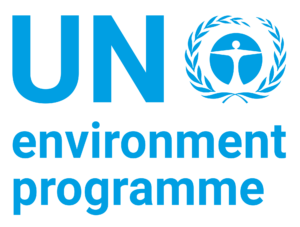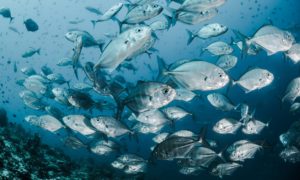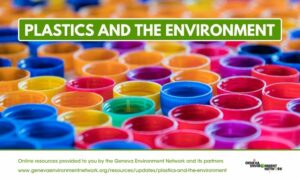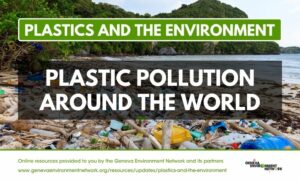Newsletter 20 Jun 2022
Environment: What’s Up in GENeva | 20 – 26 June 2022

The Geneva Environment Network’s weekly newsletter includes the latest information on the global environmental agenda, main events, job vacancies, as well as other useful resources and updates. Stay tuned and follow us also on Twitter, Facebook, LinkedIn, Youtube, or visit our website regularly for additional updates.
WTO Ministerial Conference Outcomes: Historic Deal on Fisheries Subsidies & More
At last week’s World Trade Organization (WTO) 12th Ministerial Conference (MC12) – its topmost decision-making body – members secured an unprecedented package of decisions which “demonstrate that the WTO is, in fact, capable of responding to the emergencies of our time”, as pointed out by WTO Director-General Ngozi Okonjo-Iweala. In the outcome document (WT/MIN(22)/W/16/Rev.1), members recognized “global environmental challenges including climate change and related natural disasters, loss of biodiversity and pollution”, noting the “the importance of the contribution of the multilateral trading system to promote Agenda 2030 and its Sustainable Development Goals” → Read the press release
MC12 marked a memorable moment as governments adopted an agreement on fisheries subsidies (WT/MIN(22)/W/22), after more than twenty years of negotiations. The agreement aims to curb harmful subsidies to stop depleting fishing stocks, while ensuring support to vulnerable communities which depends on these resources. Under this new treaty, subsidies for vessels and operators engaged in illegal, unreported, or unregulated (IUU) fishing are prohibited. It bans support for fishing in overfished stocks and for fishing in unregulated high seas. Provisions on special and differential treatment give more flexibility to developing countries. WTO members have committed to continue negotiations and discuss new rules at further meetings.
“On fisheries subsidies, WTO members have for the first time concluded an agreement with environmental sustainability at its heart. This is also about the livelihoods of the 260 million people who depend directly or indirectly on marine fisheries.” — WTO DG Ngozi Okonjo-Iweala
“Among many amazing deliverables, and after 21 years, members concluded the multilateral Agreement on Fisheries Subsidies during MC12. Great contribution to Ocean sustainability, fisheries, and the livelihoods of millions of people. Historic.” — H.E. Amb. Santiago Wills, Chair of fisheries subsidies negotiations
“This agreement matters because it will require governments to think critically about their subsidy policies and how they interact with efforts to manage natural resources sustainably.” — Alice Tipping, Lead, Sustainable Trade at IISD
“Recognising that there are still outstanding issues for WTO members to discuss, we were pleased to see them commit to recommending further rules on harmful fisheries subsidies at the next ministerial conference.” — Isabel Jarrett, Manager, Reducing Harmful Fisheries Subsidies, The Pew Charitable Trusts
The “Geneva package” adopted by members also includes decisions on food insecurity, the World Food Programme (WFP), on COVID-19 and future pandemic, as well as intellectual property rights. On the issue of agriculture, another important discussion for sustainable development and the environment, members could not agree on a programme of work due to divergences on key aspects. Negotiations on this topic should continue at MC13, in December 2023.
During MC12, several members reaffirmed the important role that WTO could play on the issue of plastic pollution. In a Ministerial Statement issued on 13 June, the cosponsors of the WTO Dialogue on Plastic Pollution expressed their commitment “to addressing the trade–related aspects of plastic pollution and to identifying opportunities for cooperation on trade and trade policies that could support the range of domestic and international efforts underway to reduce plastic pollution”.
In the margins of MC12, the Trade Ministers of Ecuador, the EU, Kenya and New Zealand co-hosted an informal breakfast dialogue on the nexus of trade, climate and sustainable development, and agreed to work jointly to forge an inclusive Coalition of Trade Ministers on Climate, reflecting their shared commitment to bringing the fight against climate change to the forefront of trade policy. The first Coalition meeting would take place early next year.
Climate Change High on Human Rights Council Agenda
Last week, the Human Rights Council opened with a high-level event to commemorated its landmark 50th session (HRC50), wherein the UN Secretary General and the President of UN General Assembly highlighted the importance of protecting human rights in the context of climate change, and fostering cooperation between New York and Geneva.
This week, climate change will be one of the key topics discussed at HRC50, with the interactive dialogue with the new Special Rapporteur on climate change (SR Climate) scheduled on 23 June. The advanced unedited version of the Special Rapporteur report to be discussed during the dialogue highlights six key priorities for the mandate:
- The promotion and protection of human rights in the context of mitigation, adaptation, and financial actions to address climate change, with particular emphasis on loss and damage;
- Addressing the human rights implications of climate change displacement including legal protection of people displaced across international borders;
- Exploring approaches to enhance climate change legislation, supporting climate change litigation and advancing the principal of intergenerational justice;
- Corporate accountability with respect to human rights and climate change;
- The protection of human rights through just transition for workers in industries that contribute to climate change; and
- Exploring the impacts of new technologies associated with climate change mitigation on human rights.
While at the Stockholm+50 Conference, that took place the first week of June, governments recognized the need to phase out all fossil fuels, at the 56th session of the Subsidiary Bodies to the UN Framework Convention on Climate Change (SB56), that took place the two following weeks, negotiators were not able to reflect the urgent reality of billions of people suffering from climate inaction and climate-induced loss and damage. → Find out more in UNFCCC press release | CIEL’s statement | ENB coverage
It will be interesting to hear this week from SR climate and the numerous stakeholders working at the forefront of climate change and human rights in Geneva and abroad on how we can better address climate justice and achieve the results needed in the upcoming climate negotiations. In addition ot SR Climate interactive dialogue, this week don’t miss:
- Geneva Climate Change Consultation Group (GeCCco) and the Geneva Environment Network side event “The Rights Holders’ Challenges Facing Climate Change” with SR Climate and other leading experts to exchange on the importance of protecting the rights of people affected by climate change. → Register on Webex and join us online Friday 24 June, at 13:30 CEST
- GeCCco and partners are hosting two additional side-events dealing specifically with climate change induced displacement (22 June) and a just green transition (23 June)
- Other special rapporteurs are also presenting reports that address environmental related issues, including climate.
→ Follow HRC50 coverage and find useful resources in our HRC50 update.
Transition to a Toxic-Free Future
The 2021-2022 meetings of the Conferences of the Parties to the Basel, Rotterdam and Stockholm Conventions (BRS COPs) concluded last Friday, agreeing on 23 specific decisions under the Basel Convention, 9 under the Rotterdam Convention, 16 under the Stockholm Convention, and 7 joint decisions, adding up to a total of 55 decisions. Major decisions taken relate to e-waste movement and ban of harmful chemicals affecting firefighters:
- Upon the proposal by Ghana and Switzerland, the Conference of the Parties to the Basel Convention adopted landmark amendments, ensuring that all transboundary movements of e-wastes, whether hazardous or not, are subject to the prior informed consent of the importing state and any state of transit.
- The meeting of the Conference of the Parties to the Stockholm Convention listed perfluorohexane sulfonic acid (PFHxS), its salts, and PFHxS-related compounds in Annex A to the Convention, setting them for elimination. PFHxS are widely used in firefighting foam, carpets, and non-stick cookware. They have been found to influence the human nervous system, brain development, and thyroid hormone.
- The Conference of the Parties to the Rotterdam Convention agreed to list two chemicals to its Annex III, meaning that the trade in these chemicals will need to have the prior informed consent of importing countries. However, a small number of countries blocked the listing of five other chemicals – chrysotile asbestos, acetochlor, carbosulfan, fenthion, and paraquat.
Find out more on the outcomes:
- IISD Earth Negotiations Bulletin
- BRS COPs conclude with major decisions on e-waste movement and ban of harmful chemicals affecting firefighters | Press Release | BRS Conventions Secretariat | 17 June 2022
- A BRS Cha-Cha: UN Chemicals Negotiations Make Some Key Advances, Delay Already Overdue Protections, and Offer Lessons for Future Plastics Treaty | CIEL | 17 June 2022
The Geneva Environment Network took part in the BRS COPs, with a stand featuring the Geneva Beat Plastic Pollution Dialogues, and co-organized or supported various side events. → Watch the videos and read summaries of events
Happening Abroad
Important meetings taking place abroad to shape the global environmental agenda this week include:
- Convention on Biological Diversity: Fourth meeting of the Open-ended Working Group on the Post-2020 Global Biodiversity Framework (WG2020-4) | 21-26 June | Nairobi, Kenya
- 62nd GEF Council | 21-23 June | Washington DC, USA
- 1st Meeting of States Parties to the Treaty on the Prohibition of Nuclear Weapons | 21-23 June | Vienna, Austria
What (Else) Should I Read Next?
- New global biodiversity framework falls short on inclusion of chemical pollutants, say environmental experts | University of Toronto | 16 June 2022
Ahead of CBD negotiations in Nairobi this week, scientists from various institutions in Switzerland and abroad are calling for more comprehensive inclusion of chemical pollutants in the post-2020 Global Biodiversity Framework. They argue that the current draft agreement falls short by leaving out many chemicals of high concern and importance, such as mercury, PFAS and pharmaceuticals. - In his own words: Dom Phillips’ reporting on Brazil and the Amazon | Dom Phillips and Bruno Pereira | The Guardian | 17 June 2022
Outstanding pieces of journalism from Dom Phillips, whose death in the Amazon has shocked many. - UN Plan for the FSO Safer Tanker Stop the Red Sea Catastrophe | United Nations
Moored off Yemen’s Red Sea coast, the FSO Safer is an aging supertanker in advanced state of decay that will soon break apart or explode if the world does not act. - Plastitar: mix of tar and microplastics is new form of pollution, say scientists | The Guardian | 13 June 2022
A new plastic formation named for the first time as “plastitar” has been reported in several places off the coast of the Canary Islands, Spain, in particular, in three microplastics hotspots of this region. - Pillaged timber in Senegal/The Gambia: Swiss authorities have opened a criminal investigation | TRIAL | 18 June 2022
According to information provided by the Swiss television station RTS, the Office of the Attorney General of Switzerland (OAG) has requested international legal assistance from the Gambia in a case of rosewood looting involving a Swiss businessman
Events
See all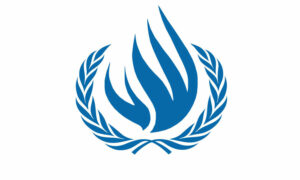
Body Meeting
50th regular session of the Human Rights Council | HRC50
13 Jun – 08 Jul 2022
Palais des Nations
HRC
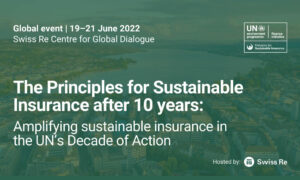
Conference
The PSI after 10 years: Amplifying Sustainable Insurance in the UN’s Decade of Action
19 – 21 Jun 2022
Swiss Re Centre for Global Dialogue & Online
Swiss Re Institute, UNEP

Body Meeting
Seventy-fifth session of the WMO Executive Council | EC-75
20 – 24 Jun 2022
WMO HQ & Online
WMO
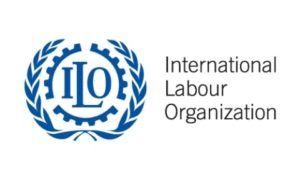
Body Meeting
Tripartite Validation of the Technical Guidelines on Biological Hazards
20 – 24 Jun 2022
International Labour Organization
ILO
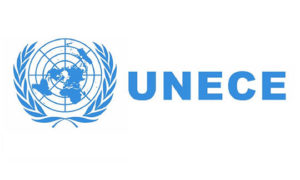
Body Meeting
46th meeting of the Working Group on Implementation
20 – 21 Jun 2022
Online | Webex
UNECE Convention on the Transboundary Effects of Industrial Accidents
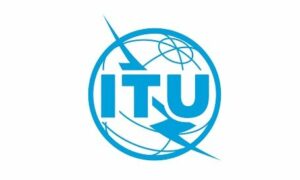
Body Meeting
SG5 – EMF, environment, climate action, sustainable digitalization, and circular economy | Meeting of Study Group 5
21 Jun – 01 Jul 2022
ITU Headquarters
ITU
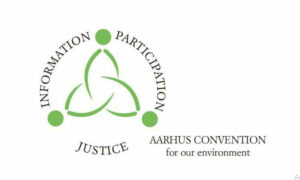
Body Meeting
26th meeting of the Working Group of the Parties & Extraordinary session of the Meeting of the Parties to the Aarhus Convention
22 – 24 Jun 2022
Palais des Nations | Room XVIII
UNECE
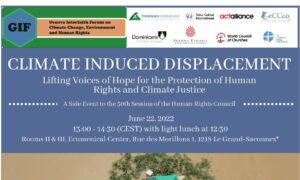
Conference
Climate Induced Displacement: Lifting Voices of Hope forthe Protection of Human Rights and Climate Justice | HRC50 Side-Event
22 Jun 2022 13:00 – 14:30
Ecumenical Center & Online
ACT Alliance, Franciscans International, GeCCco, Geneva Interfaith Forum on Climate Change, Environment and Human Rights, LWF, WCC


Virtual
Fossil Fuel Investment Protection and the Risks for Climate Action
23 Jun 2022 15:00 – 16:30
Online | Zoom
IISD
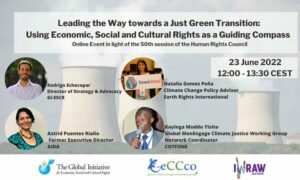
Virtual
Leading the Way towards a Just Green Transition: Using Economic, Social and Cultural Rights as a Guiding Compass | HRC50 Side Event
23 Jun 2022 12:00 – 13:30
Online | Zoom
GeCCco, GI-ESCR, IWRAW (Asia Pacific)

Virtual
The Rights Holders’ Challenges Facing Climate Change | HRC50 Side Event
24 Jun 2022 13:30 – 15:00
Online | Webex
GeCCco, GEN
Jobs
See all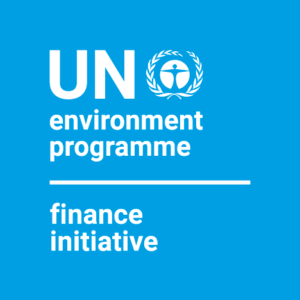

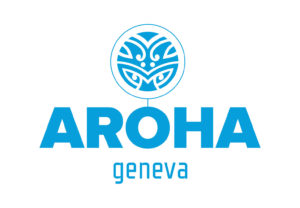

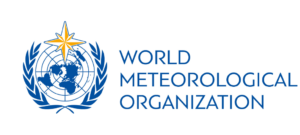
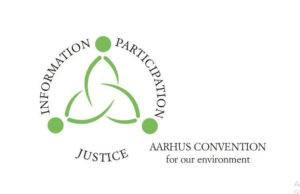



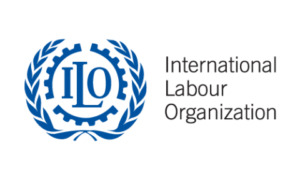

Intern
Sectoral Policies for Forestry, Agriculture, Construction and Tourism Workers Internship
24 Jun 2022
ILO


Intern
Internship – Nature-based Solutions, Climate Change Adaptation and Green Works
24 Jun 2022
ILO
